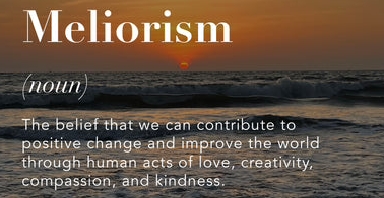
Meliorism is a philosophical concept that posits that the world can be made better through human effort, and that progress is not only possible but also likely.
Unlike optimism, which suggests that everything will eventually turn out well regardless of human intervention, meliorism acknowledges the need for active engagement and improvement.
It recognizes that while the world may not be perfect, it can be improved through conscious efforts and actions.
1. Human Agency: Meliorism assumes that individuals and societies have the capacity to enact change and improve conditions.
2. Progress is Possible: It holds a belief in the potential for progress and improvement in various aspects of life, including social, political, and ethical dimensions.
3. Moral Responsibility: There is an underlying moral imperative to strive for improvement and to take responsibility for the consequences of one’s actions.
4. Realistic Optimism: Meliorism combines a realistic understanding of the challenges faced with an optimistic view that positive change can occur.
•John Dewey: An American philosopher and educational reformer, Dewey emphasized the importance of democracy and education in fostering human growth and societal improvement.
• William James: A prominent psychologist and philosopher, James advocated for a pragmatic approach to truth and believed in the potential for human improvement through experience and action.
• George Santayana: Although primarily known for his work in aesthetics and philosophy of history, Santayana’s views on the importance of experience and human endeavor align with meliorist thought.
• Education: Meliorism plays a significant role in educational philosophy, advocating for continual improvement in teaching methods and learning environments.
• Ethics and Social Philosophy: It informs discussions about social justice, human rights, and moral responsibility, emphasizing the importance of actively working towards a better society.
• Political Theory: Meliorism can be seen in theories that advocate for reform and improvement in political systems and governance.
In the context of education, meliorism encourages innovative teaching practices, critical thinking, and a focus on experiential learning.
It promotes the idea that education should not only transmit knowledge but also empower individuals to effect change in their communities.
In social and political domains, meliorism encourages engagement in civic activities, advocacy for social change, and the pursuit of policies that aim to improve societal conditions.
This philosophy supports the notion that knowledge is not static; it evolves through collective efforts to address societal issues.
Overall, meliorism is applicable to the advancement of knowledge in various domains by fostering a culture of inquiry, responsibility, and action-oriented progress.
It encourages individuals and groups to actively participate in the improvement of their circumstances, thereby contributing to the broader advancement of society.






Lecture Notes on Research Topics

Teaching and Assessment Strategies: A Comprehensive Guide

Reflecting and Improving Instructional Design for Attitudinal Change